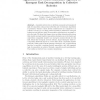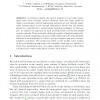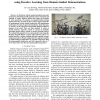329 search results - page 51 / 66 » A Neural Network-Based Approach to Robot Motion Control |
PPSN
2004
Springer
14 years 2 months ago
2004
Springer
A scalable architecture to facilitate emergent (self-organized) task decomposition using neural networks and evolutionary algorithms is presented. Various control system architectu...
ICANN
2005
Springer
14 years 2 months ago
2005
Springer
Abstract. In practice, almost all control systems in use today implement some form of linear control. However, there are many tasks for which conventional control engineering metho...
CEC
2010
IEEE
13 years 9 months ago
2010
IEEE
— This work is the first attempt to investigate the neural dynamics of a simulated robotic agent engaged in minimally cognitive tasks by employing evolved instances of the Kuram...
ECAL
2007
Springer
14 years 2 months ago
2007
Springer
Real organisms live in a world full of uncertain situations and have evolved cognitive mechanisms to cope with problems based on actions and perceptions which are not always reliab...
ICRA
2010
IEEE
13 years 6 months ago
2010
IEEE
In the future, robotic surgical assistants may assist surgeons by performing specific subtasks such as retraction and suturing to reduce surgeon tedium and reduce the duration of s...



